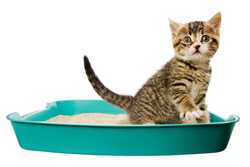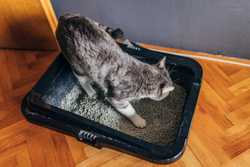How Often to Clean a Litter Box, According to Veterinarians
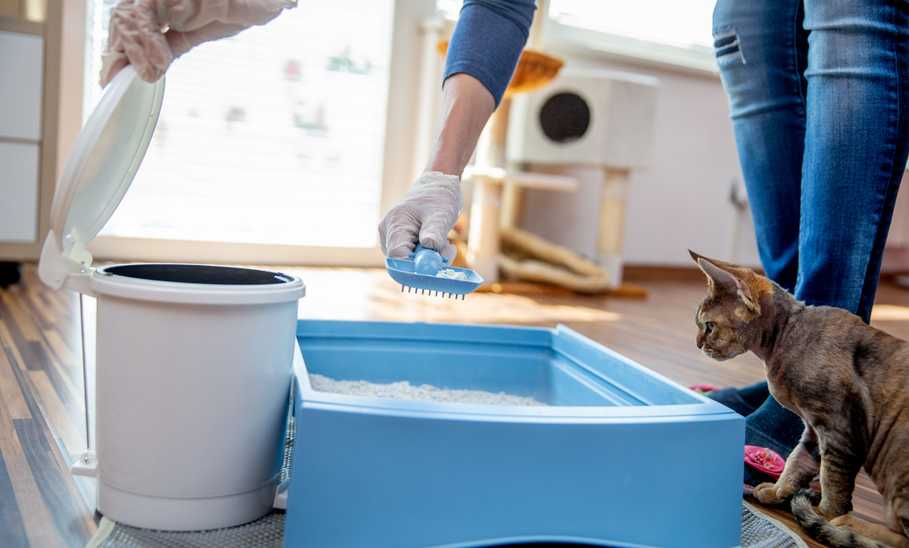
Our evaluations and opinions are not influenced by our advertising relationships, but we may earn a commission from our partners’ links. This content is created by TIME Stamped, under TIME’s direction and produced in accordance with TIME’s editorial guidelines and overseen by TIME’s editorial staff. Learn more about it.
Cats are adorable, joyful, affectionate bundles of floof. They are also masters of their own dark dimension of stench. Choosing the best litter box for cats is only step one of dealing with this problem, as you also need to clean it regularly—unless you spring for one of the best self cleaning litter boxes instead. But how frequently do you really need to deal with the litter box? We sought expert advice on how often to clean a litter box and here’s what we found.
“In addition to wanting a clean and sanitary space in your home for your cat to go, a dirty litter box can lead to transmission of parasites to other cats in the home,” warns board-certified feline veterinarian Amber Carter, DVM, DABVP (Feline Practice), owner of CatVetLife and Ormond Cat Care Clinic. “Many parasites are transmitted via the fecal-oral route. This should not be a common issue if all the cats in the home are on a broad-spectrum parasiticide, like Revolution Plus (learn more about this in our guide to the best flea treatments for cats), but there are other parasites that are not treated by our most common medications.”
Keeping parasites at bay is one reason to keep it clean. Dr. Sara Ochoa, co-founder of How To Pets, gives the following advice on why keeping kitty’s box clean is so vital: “The first reason a veterinarian would suggest keeping the litter box clean is to prevent unwanted odors. It's not just about keeping your home smelling fresh: Cats are also very sensitive to smells, and if their litter box becomes too stinky, they may avoid using it altogether.”
Dr. Ochoa goes on to explain: “Cats are fastidious creatures that take cleanliness seriously. A dirty litter box might be uncomfortable for them, severely affecting their toilet habits. To make your feline friend feel comfortable and safe, it’s important to maintain a clean litter box.”
“A dirty litter box can become a breeding ground for bacteria, parasites, and other potential sources of disease,” says Dr. Ochoa. “For instance, the parasite that causes toxoplasmosis can be found in litter boxes and if not cleaned regularly, can pose health risks to both cats and humans.”
Your feline’s health is at stake, too. Dr.Ochoa explained: “When a litter box isn't cleaned often enough, your cat may end up stepping in its old waste and then grooming itself, which can lead to the spread of bacteria and potentially cause urinary tract infections.. Hence, regular cleaning is crucial to keep your cat free from such issues.”
Dr. Ochoa also discussed how if the litter box becomes too dirty, some cats may choose to do their business elsewhere in the house, leading to a habitual issue and a persistent problem. However, a clean litter box will keep your cat following good habits.
Finally, Dr. Ochoa added, “A clean litter box allows you to easily notice any changes in your cat's waste. Changes in frequency, color, smell, or consistency may indicate underlying health problems. Thus, maintaining a clean litter box can help in early identification of potential health issues.”
“Boxes should be scooped at least once a day, if not more,” says Dr. Carter. “I like to relate scooping the litter box to flushing the toilet. Would you only do that once a day? If there is urine or feces in the box, scoop it!”
If you’re out of the house for long periods of time, you may want to consider a litter box that can be programmed to scoop at regular intervals. Read our Litter Robot 4 review for a complete guide to this popular automatic litter box. (And by the way, litter box cleaning isn’t the only cat-related task you can get a robot to do. Check out our guide to the best automatic cat feeders that can dispense treats or food on schedule.)

“Despite scooping the box daily or more, small particles of urine or feces can be left behind, leading to a dirty box,” says Dr. Carter. “Cats have excellent senses of smell and may pick up on odors before humans do. The litter should be emptied from the box ideally every week (you could go for two weeks if it’s a box that’s not used very often).”
“Firstly, it’s important to avoid flushing cat litter down the toilet, as it can cause blockages in pipes and sewage systems,” warns Ochoa. “Instead, the most recommended method of disposal is to scoop the soiled litter into a plastic bag and tie it securely. This bag can then be placed in your regular garbage bin.”
Dr. Ochoa also reminded us that not all cat litters are environmentally-friendly. Clay-based litters, for example, do not decompose easily and can contribute to landfill waste. However, there are noweco-friendly, biodegradable litters made of materials like recycled paper, sawdust, or corn have become increasingly popular and can be safely composted or disposed of in green waste bins.
if you prefer not cleaning yourself, self cleaning litter boxes should be a good fit for you:
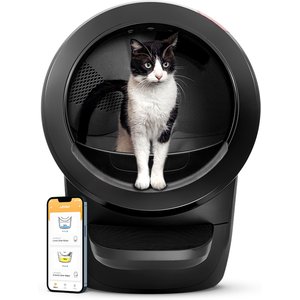
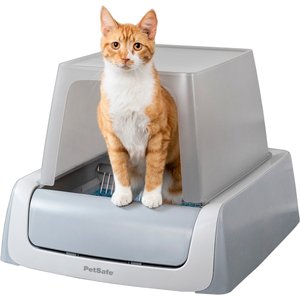
Dr. Ochoa advises washing the litter box once a week, but this can depend on the number of pets using that box, their health status, and cleanliness habits, as well as the type of litter being used. One box accommodating multiple cats may require more vigorous cleaning. Cleanliness and health conditions of your fluffy felines might also necessitate more frequent washing—for example, a cat suffering from a gastrointestinal problem can cause a messier situation, thereby demanding more thorough cleaning.
“The type of litter used also correlates with cleaning frequency,” Ochoa adds. “Clumping litter—preferred by many for its ability to absorb urine and solid waste—can be scooped easily, keeping the box relatively clean. Therefore, if you manage to scoop waste daily while using clumping litter, a weekly washing of the litter box could work. Contrastingly, with non-clumping litter, more urine is left behind, calling for thorough cleaning perhaps twice a week.
Dr. Ochoa has the following tips for ensuring a clean litter box:
This habit can avoid the accumulation of obnoxious odors and keep the area looking neat for your feline friend.
These are easy to use and can simplify the cleaning process. When it’s time to clean, simply gather up the ends of the liner and carry it off for disposal, just like a trash bag.
“Clumping litter forms easy-to-remove clumps when cats urinate. This feature makes it much simpler to scoop out and dispose of waste, leaving the box clean and fresh for longer.”
“I suggest boxes with high sides to prevent litter from getting scattered around. Also, choosing a litter box with a removable top can make your cleaning job easier,” Dr. Ochoa advised.
If multiple cats are sharing a living space, try using more than one litter box. Taking this advice helps in keeping the box clean as the cats are likely to use different boxes at different times.
Even with daily scooping, the litter in the box should be completely changed regularly. “You should replace all litter at least every two weeks, or sooner if you notice strong odors.”
Using cat-friendly deodorizers can be very useful in controlling the odor emanating from the litter box. This not only improves the atmosphere around the house, but also encourages the cat to use the box more often.
“These can be harmful or irritating to your cat. Instead, warm water and a mild detergent are typically all that’s needed.”
You can find more advice on how to clean a litter box here.
“First, cats can be possessive about their territory and belongings,” says Ochoa. “A litter box to a cat is not merely a place to release body waste, it’s a part of their domain, and hence, they mark it with their scent. Some cats might freak out or startle when their owners clean their box to reestablish their scent and presence.”
“Secondly, some cats are just sensitive to changes in their routine and the environment around them,” Ochoa continues. “Cleaning the litter box represents a change, and some cats may not react positively to it. The sudden change could lead to uncertainty, triggering inherent defensive behaviors.”
“Additionally, certain cats might view litter-cleaning as a game,” Ochoa says. “They might take your scooping and cleaning as an invitation to play. It's not necessarily being frightened–instead, they might be excited and ready for interaction.”
“Lastly, a few cats might carry past traumatic experiences surrounding cleanliness, which could be triggered while cleaning the litter box,” Ochoa concludes. “Such experiences can induce stress or anxiety in cats, causing them to freak out.”
“The International Society for Feline Medicine states that, ‘A regular cleaning regime is essential, removing feces and urine soiled litter at least once a day and cleaning the entire tray weekly.’” shares Carter. “The gold standard for the number of boxes is one for every cat, plus one. So a two-cat household should have a minimum of three boxes.”
If you’re feeling like maybe you shouldn’t have to scoop out that box so often, Ochoa has a whole bunch of reasons that you really, really should:
“Imagine having to step into a dirty, smelly bathroom every time nature calls. Cats are naturally clean animals and are sensitive to their surroundings. A neglected litter box can cause anxiety and stress in your feline friend, leading to behavioral changes like spraying or inappropriate urination.”
“When a litter box isn't cleaned frequently, the wet and soiled litter becomes a breeding ground for bacteria. Bacterial overgrowth in the litter box can lead to urinary tract infections (UTIs) in cats. UTIs are not only painful for your pet but also require veterinary intervention and medication.”
“The stench emanating from a neglected litter box can quickly infiltrate your home, making it an unpleasant living environment for both you and your cat. The strong ammonia-like smell of urine and the lingering odor of feces can be overpowering and hard to get rid of. Regular scooping eliminates odor buildup and keeps your home fresh.”
“An unkempt litter box can attract flies, cockroaches, and other insects, which may carry parasites. These creepy crawlies can quickly spread throughout your home, potentially causing health hazards for everyone residing there, including your beloved cat.”
“While it may seem counterintuitive, neglecting the litter box actually leads to a greater need for more frequent scooping in the long run. If your cat's litter box becomes too dirty, your feline companion may refuse to use it, resulting in accidents outside the box. Regular scooping ensures your cat always has a clean and suitable place to relieve themselves.”
“Cats are creatures of habit and seek consistency in their environment. If they associate their litter box with negative experiences due to neglect, they may avoid using it altogether. This can lead to feelings of social isolation and depression in your cat, manifesting through changes in appetite, grooming habits, and overall mood.”
The information presented here is created by TIME Stamped and overseen by TIME editorial staff. To learn more, see our About Us page.


